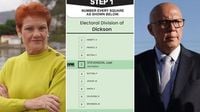In a dramatic shift ahead of the upcoming elections, Pauline Hanson’s One Nation party has amended its how-to-vote cards to favor the Liberal Party in at least ten marginal seats where the Coalition is under pressure. This decision comes as a response to Clive Palmer's Trumpet of Patriots party, which has chosen to preference Teal independents and Labor over the Coalition in certain districts. With pre-polling already underway, the reprinting of these cards is seen as a strategic move to bolster the Coalition's chances in critical contests.
According to ABC News, Hanson expressed her displeasure with Palmer’s actions, labeling them as "destructive." She stated, "He’s just throwing his weight in this election because he can. He has the money, but he’s not there for the right reasons." This change could significantly influence the election outcome, especially in tightly contested seats like Hunter and Paterson, where the margins are razor-thin.
In the seat of Hunter, Labor currently holds a slim 3.31 percent margin, and One Nation, which garnered 9.9 percent of the vote in 2022, could sway the outcome with its new preferences. Similarly, in Paterson, where Labor's Meryl Swanson leads by just 2.6 percent, the impact of One Nation's preferences could be pivotal. In 2022, six out of ten One Nation first-preference votes ended up with the Liberal candidate in Paterson, and this proportion could rise with the explicit recommendation from One Nation.
One Nation's preference changes are not limited to these two seats; they also encompass several others, including Whitlam, Shortland, Blair, Monash, Bruce, and Lyons. The party's chief of staff, James Ashby, noted that the restructuring of preferences was necessary to protect conservative candidates from the risks posed by Palmer's party. "If it means saving Peter Dutton by shifting a ‘how to vote’ then we will do so," Ashby stated.
The Coalition has already positioned One Nation above Labor in how-to-vote cards across 139 of 147 lower house seats this election cycle. In 57 of those seats, One Nation is specifically preferenced second, highlighting a stark departure from past strategies where leaders like John Howard and Scott Morrison advocated for placing One Nation last on ballots.
Meanwhile, the relationship between Labor and the Greens has also been strained due to preference deals. The Greens have announced they will preference Labor over the Coalition in every seat except for Macnamara, where sitting MP Josh Burns has opted for an open ticket. This decision has drawn criticism from the Greens, who accused Labor of making a "dirty" deal with the Liberals. Macnamara is held by Burns with a 12.2 percent margin, and the seat has a significant Jewish population, which has influenced Labor's decision to avoid directly preferencing the Greens.
Historically, Labor has relied on the flow of preferences from its supporters to the Greens, which typically sees a strong correlation. However, with an open ticket in Macnamara, the flow of preferences may be weaker than expected. Antony Green, an election analyst, indicated that the order of exclusion will be crucial in determining whether the seat falls to the Greens or the Liberals if Labor comes in third.
In the broader context of the election, Prime Minister Anthony Albanese has emphasized the importance of securing first preference votes, particularly in light of the Coalition's current standing in the polls. "We have a mountain to climb," Albanese remarked, acknowledging the challenges ahead. Despite the odds, Opposition Leader Dutton remains optimistic, asserting that voters will consider their current hardships compared to three years ago.
As the election draws closer, the evolving dynamics of preference deals are set to play a critical role in shaping the political landscape. With One Nation's recent moves and the ongoing tensions between major parties, the outcomes in these key marginal seats could ultimately decide the fate of the Coalition and its leadership.
In conclusion, the strategic maneuvers surrounding preference deals illustrate the complexities of Australian politics, where alliances can shift rapidly in response to emerging threats. As voters head to the polls, the influence of these decisions will be closely watched, with the potential to reshape the future of the nation's governance.




